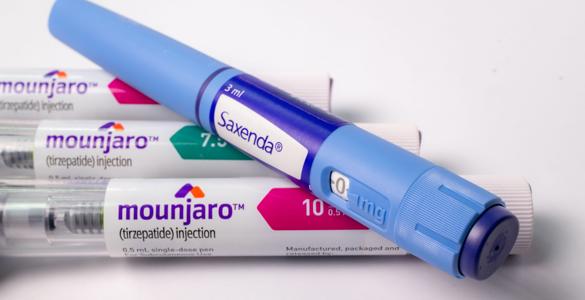There’s been a surge in demand for weight loss drugs (such as Mounjaro) during recent months.
Currently, provision of weight loss medication on the NHS in Wales is limited to specialist weight management services, and many people are accessing these drugs via private prescription or other sources, often online.
This article looks at the availability of medicines for weight management in NHS Wales, and highlights some of the key concerns about the growing market for weight loss medication.
Which weight loss medications are available in the NHS?
A number of medicines have been licensed for weight management during the last few years. These include the GLP-1 medicines semaglutide (Wegovy), liraglutide (Saxenda), and tirzepatide (Mounjaro).
GLP-1 medicines reduce appetite by mimicking the hormone glucagon-like peptide-1 (GLP-1), which is released after eating and makes people feel full. They should be used alongside a reduced-calorie diet and increased physical activity.
(Note: Ozempic is another branded preparation of semaglutide. In the UK it is licensed for the treatment of type 2 diabetes, not for weight management).
Orlistat (brand names Xenical, Alli, and Orlos) is a different type of medication that works by preventing some of the fat from the food you eat being absorbed. Orlistat (under the brand name Xenical) is available on prescription (e.g. from your GP), or can be bought at a lower dose from pharmacies (under the brand names Alli and Orlos).
Can I get weight loss medication from my GP?
In line with National Institute for Health and Care Excellence (NICE) guidance, semaglutide (Wegovy) and liraglutide (Saxenda) are available to eligible patients in NHS Wales and NHS England through specialist weight management services only (i.e. they cannot be prescribed by GPs).
In December 2024, NICE recommended that tirzepatide (Mounjaro) can be prescribed by GPs, as well as in specialist weight management services. Eligible patients include those who have:
- a body mass index (BMI) of at least 35 kg/m2; and
- at least one weight-related medical condition (these include hypertension, dyslipidaemia, obstructive sleep apnoea, cardiovascular disease, and type 2 diabetes).
(A lower BMI threshold (usually reduced by 2.5 kg/m2) is used for people from South Asian, Chinese, other Asian, Middle Eastern, Black African or African-Caribbean ethnic backgrounds).
Due to the high costs of implementing the recommendation and concerns about service and clinical capacity, NHS England and NICE have agreed a phased approach to implementation over 12 years.
In England, Mounjaro started to be made available in primary care settings to prioritised cohorts of eligible patients from June 2025. The total eligible population, as outlined in the NICE guidance, should have access within the maximum period of 12 years.
Whether, or when, people in Wales might be able to access Mounjaro via their GP is at this point less clear. In a letter to health boards, GPs, and pharmacies (May 2025) the Welsh Government said that work is being undertaken to determine if and how Mounjaro, and other weight loss medications licensed in the future, will be made available in the NHS in Wales.
This work will consider implementation arrangements for primary care alongside the current specialist weight management services, assessment of capacity and costs, and developing safe and efficient delivery models that are scalable and sustainable.
[…]
Welsh Ministers will make a decision regarding any extended deployment of tirzepatide [Mounjaro®] once this work is completed and we will write to NICE, local health boards and primary care contractors, outlining those arrangements in due course.
In the interim, tirzepatide, semaglutide and liraglutide, for weight loss should only be prescribed through specialist weight management services in the NHS in Wales.
How many people take weight loss medication?
This isn’t known. While some data may give an indication of the rise in demand there is no accurate, overall picture. For example, it’s been reported that an estimated 1.5 million people in the UK used weight loss medication in March 2025, and that the UK weight management market has grown by 24.6% each month since October 2024.
According to a recent National Pharmacy Association survey, 21% of adults had attempted to access weight loss medication in the last year through an in-person or online pharmacy, rising to 35% of 16–34 year olds.
It's impossible to tell how many people may be obtaining weight loss medication through unregulated sources, including via social media. But it’s likely that for some of these people at least, medication may not be clinically appropriate.
What are the concerns about weight loss medication?
While recognising the role of weight loss medications as part of a pathway of care, the Health and Social Care Committee’s new report on obesity cautions that many people may be attracted to using these medications without appropriate support or an understanding of the potential side effects, and without the other lifestyle changes that are necessary for long-term, sustainable changes to their weight.
GLP-1 medicines such as semaglutide (Wegovy), which in the NHS are only prescribed in specialist weight management services, are recommended to be used for a maximum of two years. This is because people are generally only able to access these services for a two year period, and because there’s currently a lack of evidence for the medicine’s longer term use. Public Health Wales told the Committee:.
in two years' time, you are going to have an awful lot of people coming off Wegovy or other drugs, putting the weight back on, and they will be exactly back where they started, and all we have done is delay the wave of ill health.
NICE’s guidance on tirzepatide (Mounjaro) does not include a two year stopping rule.
And while there are already concerns about the capacity of the NHS to meet increasing demand for weight loss drugs through its own services, there may also be a knock-on impact on the NHS from monitoring and treating side effects of medication obtained elsewhere. There’s a lack of data currently to show how significant an issue this may be.
For weight loss drugs accessed outside the NHS, a further range of concerns have been highlighted, including:
- the perceived ease with which people can obtain these medicines, and the robustness of the methods used by online providers to determine clinical suitability;
- concerns that some private providers are setting inappropriate prescribing targets or incentives;
- the illicit supply of weight loss medicines, and also the risk of receiving ‘fake’ medications which may contain dangerous substances;
- concerns that the recent price increases announced by Mounjaro’s manufacturer could limit patient access and exacerbate health inequalities.
Some of these issues are discussed in more detail in this House of Commons Library briefing (April 2025).
The Health and Social Care Committee says that weight loss medications are not a long-term solution; they do not address the causes of overweight and obesity. But while they may not be a ‘magic bullet’, their use is only likely to increase, both within and outside the NHS.
Article by Philippa Watkins, Senedd Research, Welsh Parliament.






